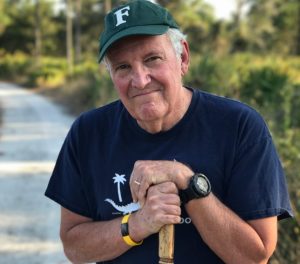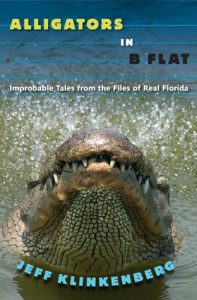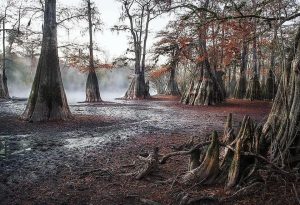Jeff Klinkenberg
Author, Speaker
B.S. Journalism 1971, Hall of Fame 2010
 Jeff Klinkenberg is a devotee of Florida, a rare breed of native son who has embraced Florida’s beauty, faults, and immense changes. The reason? He searched harder for the stories of real Florida. In fact, for nearly four decades as a writer for the Tampa Bay Times (formerly the St. Petersburg Times), his column “Real Florida” was a direct pipeline by which he could illuminate the people, places, and problems of Florida to readers with unmistakable wit, narrative style, and effervescent reverence.
Jeff Klinkenberg is a devotee of Florida, a rare breed of native son who has embraced Florida’s beauty, faults, and immense changes. The reason? He searched harder for the stories of real Florida. In fact, for nearly four decades as a writer for the Tampa Bay Times (formerly the St. Petersburg Times), his column “Real Florida” was a direct pipeline by which he could illuminate the people, places, and problems of Florida to readers with unmistakable wit, narrative style, and effervescent reverence.
While not an environmental reporter by trade, his work always spotlighted the natural settings of Florida, from the springs and the swamps and the oceans to the rural towns and overlooked spots where grime might be just as easily found as beauty. As the years went on, more of his work focused on the disappearance of nature in the face of overdevelopment and overpopulation.
Klinkenberg is the author of six books, most recently Son of Real Florida: Stories from My Life and Alligators in B-Flat: Improbable Tales from the Files of Real Florida and is the 2018 recipient of the Florida Humanities Council Lifetime Achievement Award for Writing.
What inspired you to devote so much of your career to natural Florida, and what keeps you at it decades later despite the ecological loss you’ve seen in that time?
I never considered myself an environmental or even natural history writer though I did many stories about those subjects in almost a half-century career. For decades, I was the Florida writer for the Tampa Bay Times and wrote about history, natural history, food, music, art, folk culture, crime, and, of course, our state’s interesting people. I thought I could write about any subject looking through the prism of Florida.
I wasn’t a straight news or investigative reporter. I was a narrative story teller. I was interested in reaching as many readers as possible, not just readers interested in environmental issues.
All that said, I grew up in Florida, I paid attention, and I noticed the changes, many for the worst. One subject I wrote about, again and again in my career, was the clash between modern and wild Florida.
 For a good example of what I’m talking about, you might look for the bear story, “Jarhead,” in my book Alligators in B-Flat, and an essay about sea turtles in the same book.
For a good example of what I’m talking about, you might look for the bear story, “Jarhead,” in my book Alligators in B-Flat, and an essay about sea turtles in the same book.
Here’s a link to another one. A slightly different version appears in my most recent book, Son of Real Florida: Stories from My Life.
What’s your favorite story of how journalism or communications, your work or someone else’s, made a difference of behalf of Florida’s environment?
It’s hard to say. Sometimes it takes years and years of reporters covering the same environmental issue before it captures the interest of the public and then lawmakers.
In 1947, my friend Marjory Stoneman Douglas wrote Everglades: River of Grass. Before her book, many Floridians thought of the Everglades as a useless swamp. Her book, and her advocacy after the book, put the Everglades on the national map. That said, the Everglades still suffers from many problems and politicians continue to fight about it.
What’s the most critical environmental threat facing Florida, and the most meaningful action the state and its citizens can do to help?
One, there are simply too many of us living in Florida. When my parents moved to Florida in 1951 our state boasted 3 million residents. Now we’re approaching 21 million. Our natural resources are under a tremendous burden.
Two. So many people and not enough water. I recommend everybody here seek out the books by Cynthia Barnett on the subject and memorize them.
 Three. Invasive plants and animals.
Three. Invasive plants and animals.
Four. I am a big fan of the Wildlife Corridor Project headed by UF graduate Carlton Ward Jr. and hatched at UF by a number of wildlife scientists who included the late Larry Harris and the late David Maehr.
Here’s a story I wrote about keeping Florida green spaces connected.
What’s your favorite spot in Florida to embrace its natural wonders?
In the summer, I enjoy visiting springs, even though many of our springs have been degraded by nearby development and ground-water pollution.
In the winter, I loved to travel to my boyhood stomping grounds, the Everglades and the Big Cypress. Orchids, alligators, barred owls, snakes, swamp men. I’m in heaven.
Here’s one you didn’t ask. Are things hopeless?
Nope. I don’t think saving Florida is hopeless as long as residents new and old are aware of what is here and why it’s important. That’s where writers come in. We need to tell the story of Florida.
